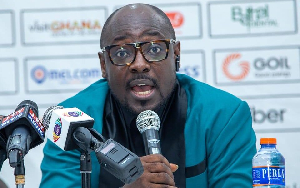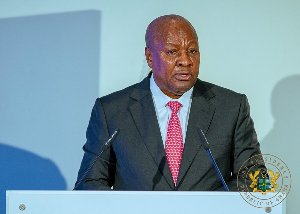Politics of Wednesday, 21 August 2019
Source: thechronicle.com.gh
Ex KMA PM exposes illegality of MPs Common Fund
A former Presiding Member of the Kumasi Metropolitan Assembly (KMA), Nana Kofi Senyah, says the MPs Common Fund is illegal because it is not consistent with the provisions of the 1992 Constitution.
He stressed that any law that is not consistent with the constitution of Ghana shall be null and void.
Pointing to Article 252 of the 1992 Constitution, Nana Senyah said Article 252 of the 1992 Constitution made it explicitly clear that, there shall be a fund to be known as the District Assembly Common Fund (DACF), under which funds shall be set aside mainly and purposely for the District Assemblies and no other institutions.
The former Ashanti Regional chairman of the Presiding Members Association explained that Article 252, in seeking to aid or facilitate development in the districts ensured that, the relevant laws and modalities are entrusted to Parliament to adjudicate and to bring about development in the districts.
Nana Senyah said the allocation of not less than 5% of the consolidated fund is clearly emphasised in Article 252 (2) of the 1992 Constitution, subject to the provisions of the constitution for which Parliament shall annually make provision for the allocation of not less than five percent of the total revenue of Ghana to the District Assemblies for development which amount shall be paid into the DACF in quarterly installments.
He said Article 252 section 3 further directs and specify the institutions where the money must go, pointing to the fact that Article 252 and all its relevant clauses do not recognise the MPs Common Fund, thus making it an illegality.
Nana Senyah’s position collaborates claims by Professor Kwamena Ahwoi, former Local Government and Rural Development Minister and the master architect of the Local Government system in Ghana that, the MPs share of the District Assemblies Common Fund (DACF) ”is most likely unconstitutional.”
Prof. Ahwoi is said to have stated, while addressing a workshop on the District Assemblies Common Fund in 2012 in Accra that, “The future of the MPs Common Fund I think is in doubt.”
Prof. Ahwoi, as Minister for Local Government and Rural Development Minister, who led the piloting of the Common Fund in the 1990s said there is no provision in the 1992 Constitution to defend the decision to allocate part of the fund to Ghanaian lawmakers.
The District Assemblies’ Common Fund (DACF) is a pool of resources created under Article 252 of the 1992 constitution of Ghana and the District Assemblies Common Fund Act, 1993, Act 455, which makes it obligatory for the Administrator of the DACF to present to Parliament a Formula for the distribution of monies allocated by Parliament for the District Assemblies every year.
It is a minimum of 5.0% of the national revenue set aside to be shared among all District Assemblies in Ghana with a formula approved by Parliament.
The fund is a Development Fund which enables the use of the nation’s wealth throughout Ghana to the benefit of all citizens.
By the formula for disbursement of the Common Fund, MPs receive four percent of the total allocation to the fund for purposes of initiating development projects in their constituencies.
The Formula considers the modern concept of development, which sees development as a multi-dimensional process involving not only economic growth, but also improvement in other living conditions such as health, education, access to potable water, good roads, adequate food supply and employment among others, with the intention of satisfying “basic human needs’.
Prof. Ahwoi had explained that the decision to allocate part of the fund to MPs in 1997 was as a result of demands from MPs for some form of financial assistance to undertake development projects, but under the control of the MPs to remove the incidence of DCEs ‘bluffing’ them.
According to Prof. Ahwoi, “Mr Owusu Acheampong, then Majority Leader from the NDC and J.H. Mensah, then Minority Leader from the NPP side, requested that part of the DACF be given to the legislators because DCEs were bluffing with the fund, else they MPs would not approve the formula for the sharing of the fund.
“It was as blatant as that. And I told them that that would be unconstitutional and they said ‘Yes, we know, but we too we need to do some projects in our areas.’
He said: “It became a big argument and a losing argument at that, because the battle was being waged by the Majority party, which was my own party, the NDC.”
In order to end the illegality, Prof Ahwoi suggested, and his suggestion adopted in the President’s Sessional Address that, an MP’s Constituency Development Fund be set up, separate from the DACF, in order to help the legislators fulfill their commitments to their constituents.
Indication was that MPs will no longer draw funds from the District Assemblies Common Fund (DACF) once the said fund became operational.
The promise to introduce a constituency development fund for MPs was first made in 2009 by President John Mills but the promise has to date not been honoured.
In the face of the illegality of the allocation of part of the DACF to MPs said to have been smuggled into the system under the cloak of legality and considered as a ‘kickback’ for MPs as a condition to approve the formula for the sharing of the fund, Nana Senyah has called for a refund of all such monies allocated to the MPs to the Consolidated Fund since it become operational.
He has also called on the Executive and the leadership of the Parliament of Ghana to ensure that the current trend is reversed to avoid further dissipation of the public fund in the name of MPs Common Fund.
The former KMA Presiding Member , who intends to seek constitutional interpretation of the District Assemblies Common Fund Act, 1993, Act 455, also accused Members of Parliament of abusing the disbursement of statutory funds including the District Assembly Common Fund, GETFund, HIPC Fund and NHIS Fund among others over the years and frowned on the complete disregard of regulations and memoranda on the part of some MP’s who are supposed to be advancing probity, accountability and transparency in the course of our democratic dispensation.
He is also calling for a probe of the disbursement of the MPs Common Fund with the explanation that it is one area where corruption thrives and need to be critically looked at to protect the interest of constituents who are the direct beneficiaries of such funds.
Nana Senyah’s concern follows alleged disregard for the Financial Administration Act which regulates the financial management of the public sector to ensure that persons entrusted with financial management ensure the effective and efficient management of state revenue, expenditure, assets and liabilities, resources of the government, consolidated fund and other public funds by some MPs.
He noted that the MPs Common Fund, though illegal, is no exception to the said financial regulations yet the MP’s have over the years abused the very law that regulates their operations regarding management of statutory funds.
He said, as agents for development in their constituencies, MP’s are enjoined to utilize the funds to improve the lot of the constituents by properly managing these funds.
The former KMA presiding Member said the Public Procurement Act 663, Amended Act 914, 2016 also enjoins all public funds account holders to go through the Public Procurement Law for tenders and biding but some MP’s have deliberately and willfully set aside this very Act they promulgated and assented.
The New Suame Assembly member said, most MPs who are also members of the Tender Committees of the District Assemblies have appointed their cronies as liaison persons between the Districts and the MP, and collect their Funds and subsequently use the monies according to the direction of the MP, who use such monies outside the Assemblies that are without any internal control or regulations of the Assemblies.












